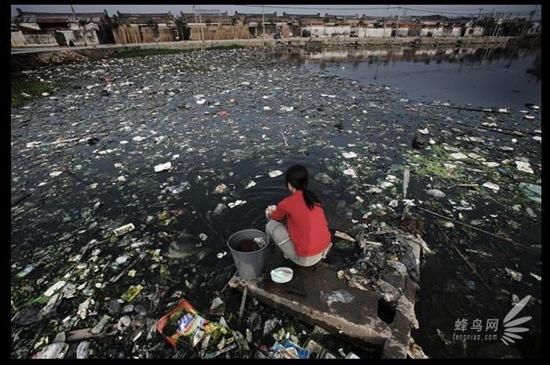Guiyu in the Shantou region in China has turned from an agricultural community to being referred to as the “e-waste capital of the world” from the mid 90s. Guiyu is another one of the digital dumps that have developed since technology has taken off, and receive both domestic and shipments of waste from overseas. The increasing amount of e-waste is due to a higher demand for electronic devices and those devices then having a short lifespan, which has made e-waste in Chine a serious environmental issue.
Thousands of men, women and children are sitting down in unsuitable working conditions and taking apart old computers, monitors, printers, phones, DVD platers, microwaves, and car batteries by hand. These products are processed in informal recycling centers by unskilled and unequipped manual labourers who apart these products to their smallest components, for example stripping wires for their copper. These methods of processing their e-waste are harmful to the soil, water, air and people, as computer components are burned over open fires in order to extract metals which also releases large amounts of toxic gases into the air. These toxic gases are generated and released by burning plastics in order to separate them from metals which is harmful to human health.

These labourers not only work in these horrible conditions contaminated by heavy metal and toxic pollutants, but they also live in them. Water and soil has become so contaminated that the underground water is no longer safe to be consumed. Many of these families have spent years here making less than 5US dollars per day. A separate report by the Shantou Medical University Hospital in November 2003 found a high incidence of skin damage, headaches, vertigo, nausea, chronic gastritis, and gastric and duodenal ulcers, especially among labourers who recycle circuit boards and plastic.

The Chinese government has taken action by putting a complete ban on the improper recycling practices, but it was quickly dropped as the government lack the adequate resources to enforce them. However, there are now a number of environmental laws, and regulations that are placed on electronic production production and e-waste management in the country. Even with these there is still a rise in the illegal shipment of e-waste into the country, and labourers who are still willing to work in these unsafe conditions. This exportation is cost saving for other countries as the processing and disposal cost of e-waste is higher than exportation costs.
On a manufacturing level, products could be made with materials that are easier and safer to recycle, which could mean not using hazardous chemicals. Companies should also take on this shared responsibility by taking back old devices for proper disposal and recycling or reuse, in order to reduce the amount of e-waste being dumped in landfill.
What we can do as consumers is to think twice before buying a new device and return your old device to the manufacturer whenever possible.

I like!
LikeLike